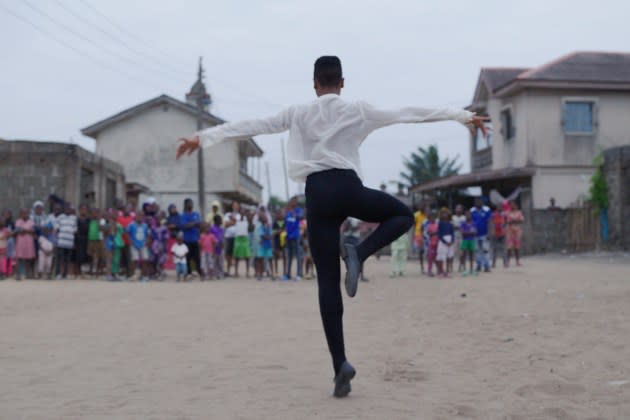‘Madu’ Review: Inspirational Doc on Young Nigerian Ballet Dancer Dazzles Visually but Lacks Depth

The graceful movements of 12-year-old Anthony Madu, a boy from Lagos, Nigeria, with a zeal for ballet, are inherently cinematic: arms stretched out to the sky, his body contorting like a determined feather fending off a gust of wind, just before he pirouettes with elegant agility that commands attention. At school, however, he faces constant bullying since his passion doesn’t fit his country’s traditional gender role expectations.
But thanks to the attention gained from a viral video of him performing, the prestigious Elmhurst Ballet School in London, England, offers Anthony a scholarship to study abroad with them for the next seven years. Inevitably, the life-changing opportunity comes with its fair share of thorny repercussions that will reshape his young identity. Co-directed by Matthew Ogens (Oscar-nominated for the 2021 documentary short “Audible”) and Nigerian filmmaker Joel ‘Kachi Benson, the inspirational doc “Madu” forgoes talking heads, opting for the observational approach to chronicle his first year in a new environment far away from home.
More from Variety
IDFA-Winning Doc 'Much Ado About Dying' Bought for U.S. by First Run Features (EXCLUSIVE)
'A Man' Review: Brooding Japanese Thriller Explores Lives Defined by Relationships with the Dead
With unusual off-center framing, the camera of cinematographer Charlie Goodger tries to match the dynamic nimbleness and refinement of Anthony’s physicality when practicing. Other sequences show the boy dancing in gritty urban areas — an abandoned building, for example — to augment the contrast between his exquisitely precise twirls and the settings of his upbringing. This decisively evocative aesthetic mandate extends to the entire film, including the interludes capturing delicate moments of contemplation or those that highlight Anthony’s feelings of alienation, making “Madu” a gorgeous visual experience.
That “Madu” employed two directors, one of them based in Nigeria, allows for a more expansive view of the story. Early on, we witness Anthony’s departure. When his understandably emotional mother and the rest of the family drop him off at the airport, the filmmakers make a surprising choice. Instead of leaving them behind and immediately focusing solely on Anthony’s London adventure, the narrative returns home with those who stayed. It’s a small moment, but it acknowledges that the sorrow of separation flows both ways, and that their lives must continue despite the absence of one of their members.
The separation affects Anthony’s younger brother most, yet that broken bond goes mostly unexplored, even though that’s where the true tragedy of their circumstances lies. What does it mean to be the kid who doesn’t get to go to London, and who realizes that his older brother is becoming someone else far away? That’s only one of the notable instances where the documentary fails to incisively engage with the socioeconomic issues at play.
Soon after his arrival in the U.K., Anthony discloses that he has trouble seeing from one of his eyes. The diagnosis adds yet another hurdle to the already difficult psychological burden of leaving his homeland at such a young age in pursuit of a dream. What eats at him isn’t the condition so much as the responsibility of succeeding not only for himself, but for the sake of his impoverished loved ones in Nigeria. During a visit back home, the boy tells his parents, religious people, that he needs a therapist. His request is dismissed, not out of lack of care but lack of understanding. The more he gains perspective on the limitations that exist where he comes from, the more a distance begins to grow between him and his family.
At Elmhurst there is support, but while well intended, it’s also laced with the reverse kind of ignorance about the intricacies of Anthony’s background. Certain interactions point to Anthony’s status as an outsider, such as a history class focusing on European history or the fact that during Christmas break, while his classmates go home, he stays at school because his family has no funds to pay for him to visit them. Still, Anthony establishes tender friendships with his mostly white British classmates. One of them, his roommate, expresses his fondness for Bob Marley, who he believes is from Nigeria, in an attempt to relate to him.
For all the beauty that the filmmakers pour into this portrait of a young life in flux and torn between two realities, they unfortunately glide over the myriad factors that influence Anthony’s position in the world. He has an incredible chance to change it, but only as long as his extraordinary talent continues to impress those with the power to help him. Little is learned about his parents or siblings, and how they perceive the situation they are part of now out of necessity. By striving to make a complex case easily palatable, the resulting doc is stunning to look at, with several undeniably heartfelt passages, but ultimately superficial.
Best of Variety
Sign up for Variety’s Newsletter. For the latest news, follow us on Facebook, Twitter, and Instagram.

 Yahoo Lifestyle
Yahoo Lifestyle 